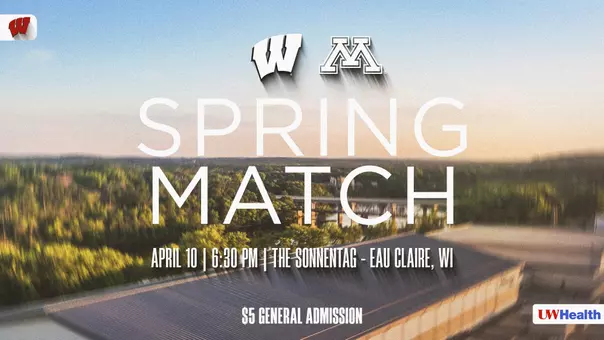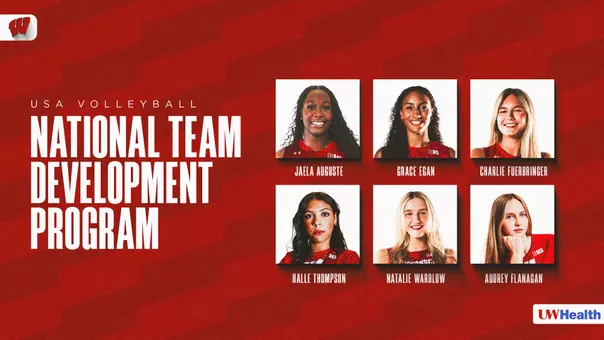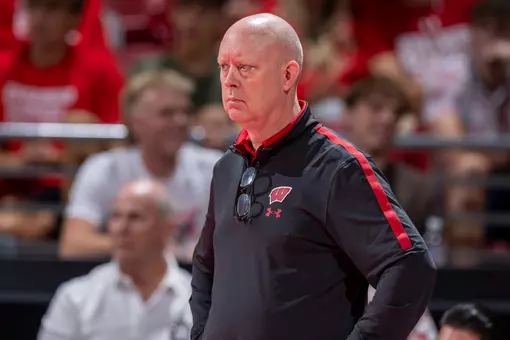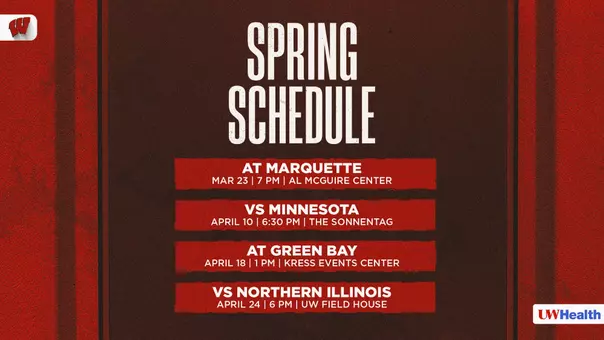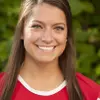Baggot: Williams brings whole heart to Badgers volleyball
December 06, 2018 | Volleyball, Andy Baggot
Senior middle blocker’s discovered true passion for mental health activism and advocacy
 |
||
|
BY ANDY BAGGOT
UWBadgers.com Insider
CHAMPAIGN, Ill. — Tionna Williams is more than just a vital piece of the Wisconsin volleyball puzzle. The senior middle blocker is an artist with an eye for portraits, an activist for mental health and an advocate for at-risk youth.
She's had paintings displayed in public, a hobby she traces back to grade school when she became enamored with calligraphy.
"Stress relief," Williams calls it.
She's initiated a campus partnership with Athletes Against Anxiety and Depression, an organization that she's come to know through personal experience with mental illness.
"I just really want to help people be OK with being in that position," Williams said.
She's become enamored with the idea of opening her own facility for kids from low-income and minority backgrounds, this after an emotional internship at the Meadowood Neighborhood Center in Madison last summer.
Williams is majoring in human development and family studies with a certificate in Afro-American studies, but wasn't sure what she wanted to do with her degree until recently.
"It was a process of finding my passion because I really didn't know what I wanted to do until I got to Meadowood," she said. "Then I fell in love with that."

For the moment, Williams is focused on closing out her career with the Badgers in an unprecedented way. They're in the Sweet 16 of the NCAA tournament for the sixth consecutive season, two matches away from a national championship semifinal berth and four wins shy of the first national championship in program history.
Sixth-seeded Wisconsin (24-6 overall) faces San Diego (18-12) in the regional semifinals Friday at 1:30 p.m. in Champaign, Illinois. The winner draws third-seeded Illinois (30-3) or Marquette (28-6) on Saturday at 3 p.m. at Huff Hall.
Despite being one of the smaller middles in the ultra-difficult Big Ten Conference at 6-foot-2, Williams is a three-time All-America honoree who has 988 kills and 498 blocks in her 126-match career. She's vying to become the sixth player in program history to be a member of the 1,000-500 club, joining Sherisa Livingston, Arlisa Hagen, Kelly Kennedy, Heather Dodaro and Haleigh Nelson.
The Badgers have won eight straight matches and Williams has distinguished herself in that run.
"She's become a great leader, someone you can always look to on the court and you know in big moments that she'll be ready no matter," redshirt junior outside hitter Madison Duello said.
We're not crying, you are. Just kidding literally everyone is crying. A standing ovation for @Tionna_q from the greatest fans in the world! #Badgers || #OnWisconsin
— Wisconsin Volleyball (@BadgerVB) November 30, 2018
Williams became the lone departing senior for the Badgers when injuries disrupted the careers of Duello and libero Amber MacDonald, all but wiping out what had been a six-person recruiting class. Williams said being on her own was an ah-ha moment.
"I had this little switch flip, like, 'This is my team, this is my time because it's my last season here. I've got to leave it all out there on the line,'" she said.
"It's always in the back of my mind that this could be my last match in a Badger uniform, so I've got to leave it all out there and make sure my teammates are on the same page."
What's fairly amazing about Williams and the depth of her outreach is that she came to Wisconsin with a very reserved nature.
"She's getting more comfortable opening that and sharing that with others," Wisconsin coach Kelly Sheffield said. "That has not been an easy thing. She doesn't allow a lot of people in. She hasn't always allowed her teammates in. She's been a difficult person for part of her career for people to know what she's thinking.
"She's always had a great heart. She just hasn't opened it up to people. I think when you get to a point where you're comfortable in your own skin and you're comfortable with who you are, sometimes you're willing to open up."

Williams said she's simply become more confident as her career as a student-athlete has unfolded.
"I'm stepping out of my comfort zone more," she said, "doing things I never imagined I'd be doing and loving every minute of it."
Williams said she's "really proud" of her initiative that led to a campus partnership with AAAD because "in years past I would never have done anything close to that."
Her own experiences with anxiety and depression date back to her senior year at Concordia Lutheran High School in Fort Wayne, Indiana.
"I felt the stigma of feeling like I had to be quiet about it," she said.
Upon arriving at Wisconsin, Williams said she made contact with Dr. Kris Eiring, the school's director of clinical and sports psychology services, but didn't maximize that relationship until after her junior season.
"It was a lot of different outside factors," Williams said her mental battle. "The season wasn't going as well as we'd hoped and your junior year, as many people know, is a really tough year in college because everything's being thrown at you at once.
"That carried over into senior year. I thought, 'I'm tired of dealing with this. I don't want to be the victim anymore.' So I had to do something about it.
"As things keep getting ramped up — as the season goes on and school gets tougher — it weighs even heavier on your shoulders. Something switched in me. I was like, 'This is not normal. It's not OK to feel this way.'
"I know I can't be the only one feeling this way," Williams said.
For Williams, who said she takes medication for her issues, her biggest obstacle was her own reluctance.
"I would never be someone to talk to someone else about my problems. That was the first step," she said.
"Talking about it helped me feel better, so I wanted to be that voice for other athletes who may be suppressing their emotions, their mental health issues.
"It's OK to not feel OK, but it's not OK not to do anything about it."
Eiring knows firsthand the unique challenges of being a student-athlete at Wisconsin. She was a standout sprinter for the women's track team in the mid-1980s.
Eiring said it's unique "for someone to come around their senior year and want to leave a legacy out of starting out with having a problem" as Williams has.
Williams made mental health the center piece of her Senior Night ceremony last month at the sold-out Field House, complete with a video message, handouts and wrist bands.
The message, Eiring said, was that student-athletes are human and it's OK to ask for help.
"It was nice to see her promote that at that level and she chose that to be her senior message," Eiring said of Williams.

What is Williams' greatest gift?
"My heart," she said. "It's kind of weird to say that, but I genuinely care about all the people I come in contact with.
"I try to put my all into everyone. I don't know if that's a gift, but it makes me happy."
Williams derived great joy from her internship at Meadowood. Though it ended in July she still maintains contact with its inhabitants.
"I love those kids," he said. "Just being around them brightened my day.
"Those kids got my mind off of things. Having an impact in their lives made my life a lot better."
Williams described her Fort Wayne neighborhood as "survival of the fittest" and said her upbringing was similar to many of the kids she encountered.
"I didn't have a Meadowood Neighborhood Center," she said. "I didn't have that positive role model I could see every day growing up and have a conversation with."
Sheffield lauded Williams for never seeking the easy way out.
"There's been barriers out there and she's just climbed over them or knocked through them, gone around them, whatever," he said.
"I think she's found the things that fill her heart and that's helping others. It's given her life meaning.
"She's bringing joy to other people, but it's actually filling her cup, her heart, as well.
"It's a really neat journey that she's been on. It's what you want for all of your kids."

